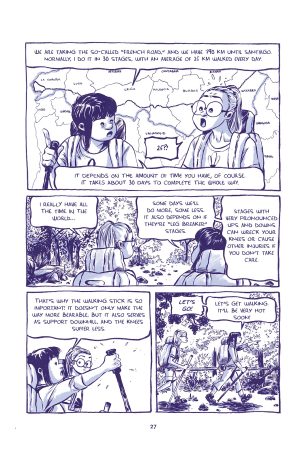Review by Frank Plowright
Emma has decided to walk the Camino de Santiago, an old pilgrimage route across Northern Spain to the Santiago de Campostela cathedral. Depending on the route taken it can be five hundred miles, although the original route only runs two hundred miles, but can take a month to walk. Tourists stay in hostels or lodgings along the way.
On the Way is José Ángel Ares and Paco Hernández in effect producing a guidebook via a fictional novice requiring all the advice and experiencing all the route has to offer. Anyone who enjoys some history and geography will learn plenty, while Hernández produces beautiful renderings of the stops along the way, be they small villages, stunning views or monuments to god.
The start is heavy on information and advice, but once the explanations are over the story begins to emerge. It’s noted the original route was a means of professing devotion, and those completing the route for spiritual reasons have additional benefits, yet there are a variety of reasons for wanting to take the walk. In Emma’s case it’s slowly revealed to be prompted by a failing relationship. Abby, who’s the first fellow traveller she meets, has walked the route before and is known, but now her path is one of redemption. What at first comes across as a contrivance to link the journey sections together eventually begins to captivate as Ares supplies a relatable cross section of people, spinning tales of sadness and of joy, and in places holding back a tear or two will prove difficult.
Eventually there’s a lesson in life. It’s one often heard, but possibly never considered as much as is ought to be, which is the journey being the purpose, not the destination. Emma’s life is changed without her realising it for much of the time, and there’s a spiritual contribution that sneaks in. The writing is subtle. Angel understates a key sequence, which passes by as metaphorical, but the realisation subsequently hits.
Just as the beginning was low key, the ending is misplaced, spelling out what didn’t need spelling out as Emma comes to terms with where she heads next. However, for some the certainty might be what’s wanted. A few obvious pages at the end don’t diminish what’s gone before and while the subject matter may not sound promising, it’s likely any empathic reader will be surprised and delighted.





